Related Research Articles

Orchestration is the study or practice of writing music for an orchestra or of adapting music composed for another medium for an orchestra. Also called "instrumentation", orchestration is the assignment of different instruments to play the different parts of a musical work. For example, a work for solo piano could be adapted and orchestrated so that an orchestra could perform the piece, or a concert band piece could be orchestrated for a symphony orchestra.
The Pomp and Circumstance Marches are a series of five marches for orchestra composed by Edward Elgar, together with a sixth march created from sketches. The marches were dedicated to his friends including composer Granville Bantock and organists George Robertson Sinclair, Ivor Atkins and Percy Hull.
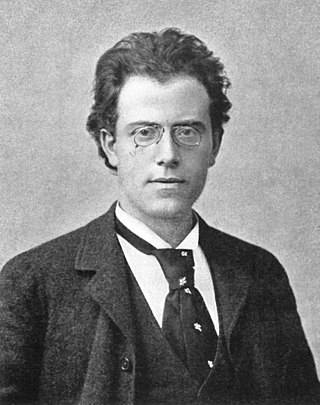
The Symphony No. 1 in D major by Gustav Mahler was mainly composed between late 1887 and March 1888, though it incorporates music Mahler had composed for previous works. It was composed while Mahler was second conductor at the Leipzig Opera in Germany. Although in his letters Mahler almost always referred to the work as a symphony, the first two performances described it as a symphonic poem and as a tone poem in symphonic form, respectively. The work was premièred at the Vigadó Concert Hall in Budapest, Hungary, in 1889, but was not well-received. Mahler made some major revisions for the second performance, given at Hamburg, Germany, in October 1893; further alterations were made in the years prior to the first publication, in late 1898. Some modern performances and recordings give the work the title Titan, despite the fact that Mahler only used this label for the second and third performances, and never after the work had reached its definitive four-movement form in 1896.

The Piano Concerto in A minor, Op. 54, by the German Romantic composer Robert Schumann was completed in 1845 and is the composer's only piano concerto. The complete work was premiered in Dresden on 4 December 1845. It is one of the most widely performed and recorded piano concertos from the Romantic period.
Romeo and Juliet, TH 42, ČW 39, is an orchestral work composed by Pyotr Ilyich Tchaikovsky. It is styled an Overture-Fantasy, and is based on Shakespeare's play of the same name. Like other composers such as Berlioz and Prokofiev, Tchaikovsky was deeply inspired by Shakespeare and wrote works based on The Tempest and Hamlet as well.
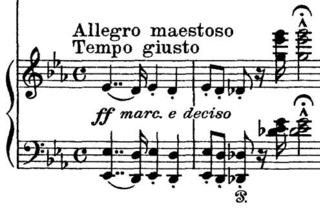
Franz Liszt composed his Piano Concerto No. 1 in E♭ major, S.124 over a 26-year period; the main themes date from 1830, while the final version is dated 1849. The concerto consists of four movements and lasts approximately 20 minutes. It premiered in Weimar on February 17, 1855, with Liszt at the piano and Hector Berlioz conducting.
The Young Person's Guide to the Orchestra, Op. 34, is a 1945 musical composition by Benjamin Britten with a subtitle Variations and Fugue on a Theme of Purcell. It was based on the second movement, "Rondeau", of the Abdelazer suite. It was originally commissioned for the British educational documentary film called Instruments of the Orchestra released on 29 November 1946, directed by Muir Mathieson and featuring the London Symphony Orchestra conducted by Malcolm Sargent; Sargent also conducted the concert première on 15 October 1946 with the Liverpool Philharmonic in the Philharmonic Hall, Liverpool, England.
An Alpine Symphony, Op. 64, is a tone poem for large orchestra written by German composer Richard Strauss in 1915. It is one of Strauss's largest non-operatic works; the score calls for about 125 players and a typical performance usually lasts around 50 minutes. The program of An Alpine Symphony depicts the experiences of eleven hours spent climbing an Alpine mountain.

Leopold Stokowski's orchestration of Pictures at an Exhibition by Modest Mussorgsky was completed in 1939 and premiered later that year, on 17 November, by the Philadelphia Orchestra.
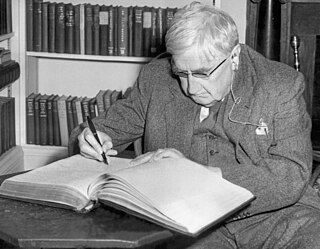
Ralph Vaughan Williams's Symphony No. 8 in D minor was composed between 1953 and 1955. Sir John Barbirolli, its dedicatee, conducted the Hallé Orchestra in the premiere at the Kings Hall in Manchester, on 2 May 1956. It is the shortest of the composer's nine symphonies, and is mostly buoyant and optimistic in tone.

The Symphony No. 5 in E-flat major, Op. 82, is a three-movement work for orchestra written from 1914 to 1915 by the Finnish composer Jean Sibelius. He revised it in 1916 and again from 1917 to 1919, at which point it reached its final form.

The Symphony No. 3 in C major, Op. 52, is a three-movement work for orchestra written from 1904 to 1907 by the Finnish composer Jean Sibelius.
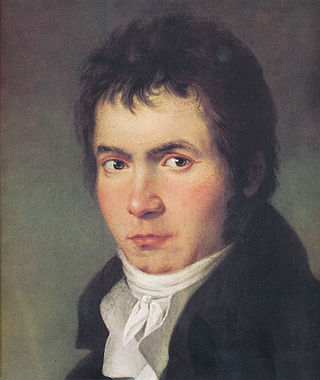
The Fantasy for piano, vocal soloists, mixed chorus, and orchestra, Op. 80, usually called the Choral Fantasy, was composed in 1808 by then 38-year-old Ludwig van Beethoven.

Tönet, ihr Pauken! Erschallet, Trompeten!, BWV 214, is a secular cantata by Johann Sebastian Bach, composed in 1733 for the birthday of Maria Josepha, Queen of Poland and Electress of Saxony. Classified in published editions as a dramma per musica, it is based on a libretto by an unknown author. The piece has the dedicatee addressed by allegorical figures representing Roman and Greek goddesses of war and peace. It is structured as nine movements, and scored for four vocal parts and a festive Baroque orchestra with trumpets, timpani, flutes, oboes and strings. Choral movements frame a series of alternating recitatives and arias. Bach led the first performance with the Collegium Musicum at the Zimmermannsches Caffeehaus on 8 December 1733.
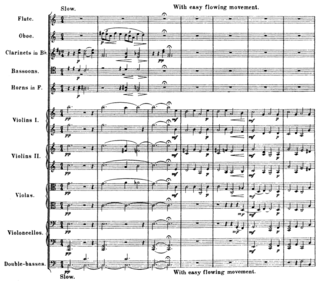
On Hearing the First Cuckoo in Spring is a tone poem composed in 1912 by Frederick Delius. Together with Summer Night on the River it is one of Delius's Two Pieces for Small Orchestra. The two were first performed in Leipzig on 23 October 1913, conducted by Arthur Nikisch. On Hearing the First Cuckoo in Spring is the longer of the two pieces, with a typical playing time of between six and seven minutes. There have been numerous recordings of the piece, which Delius's champion Sir Thomas Beecham described as much the best known of the composer's works.
Eventyr (Once Upon a Time) is a tone poem for orchestra composed by Frederick Delius in 1917. It was given its premiere in London on 11 January 1919, under the direction of Henry Wood. "Eventyr" means "adventure", and the inspiration for the piece was a fairy tale from Norway. After a twenty-bar introduction, a fantastic theme is played first by the bassoons and then by the other woodwinds. The second subject is presented by the strings and gains in intensity with the addition of another subject in counterpoint. Several climactic moments follow before the creation of a fairy world, dominated by a descending chromatic theme for strings, celesta, and harp. The piece is concluded with the return of earlier material, followed by a quiet closing section.
The Concerto Fantasy for Two Timpanists and Orchestra is a double timpani concerto written by Philip Glass in 2000. It is paired with the Cello Concerto on Vol. I of Glass' Concerto Project, a set of eight concerti by the composer. A typical performance of the work lasts 25–28 minutes. It was written for Jonathan Haas and later recorded by Evelyn Glennie, and was premiered by Haas and Svet Stoyanov with the American Symphony Orchestra in Avery Fisher Hall, Lincoln Center, conducted by Leon Botstein. The work was commissioned jointly by the American Symphony Orchestra, the Peabody Symphony, the Milwaukee Symphony, the St. Louis Symphony and the Phoenix Symphony. In 2004, a transcription for wind ensemble was written by Mark Lortz, which debuted at Peabody Institute in 2005.
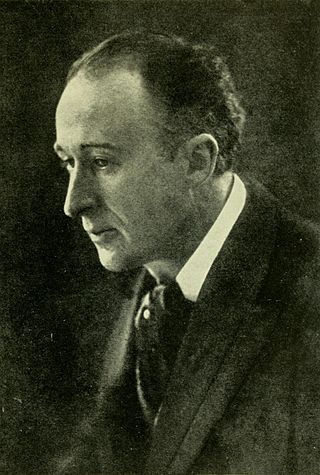
The Piano Concerto in C minor is one of the early compositions by the English composer Frederick Delius. The piece underwent repeated revisions that resulted in the existence of three major versions which significantly differ from one another. The first public performance of any version was played by Julius Buths with the conductor Hans Haym on 24 October 1904 in Elberfeld, Germany.
Les Éolides,, FWV 43, CFF 127, is a symphonic poem by French composer César Franck written in 1876 and premiered the next year. Its approximate duration is 11 minutes.

Summer Night on the River is a tone poem composed in 1911 by Frederick Delius. Together with On Hearing the First Cuckoo in Spring it is one of Delius's Two Pieces for Small Orchestra. The two were first performed in Leipzig on 23 October 1913, conducted by Arthur Nikisch.
References
- ↑ "The Delius Society Journal, April 1983" (PDF). Archived from the original (PDF) on 4 March 2016. Retrieved 10 February 2013.
- David Ewen, Encyclopedia of Concert Music. New York; Hill and Wang, 1959.